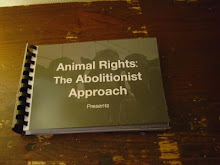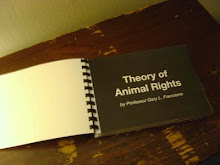Listen HERE
I am honoured to have again as my guest Professor Gary L. Francione of The Abolitionist Approach. We talk about the abolitionist approach and why it is fundamentally different from the welfare reformist approach, and we refer to the frequent discussions that occur between the two separate groups of thinkers, which is wonderfully illustrated on the blog My Face is on Fire, in a recent blog post. Please read the post and the ensuing comments to see what Professor Francione is talking about in this interview.
I also very strongly urge everyone to read this wonderful essay A Revolution of the Heart at The Abolitionist Approach which, as well as being wonderful in itself, is pertinent to the aforementioned article and commentary.
Also keep an eye out for "The Animal Rights Debate—Abolition or Regulation?" written by Gary L Francione and R. Garner - to be released from Columbia Press in the coming weeks...A MUST read for ALL involved in non human animal advocacy/activism, no matter what your position on strategy.
Thanks for coming on the show again Professor Francione!
Thursday, July 16, 2009
Subscribe to:
Post Comments (Atom)












Hi Elizabeth,
ReplyDeletePerhaps it will need someone to form this "humane rape" organisation and put to human rights organisations the arguments we get from welfarists.
Perhaps then they will see?
RY
Thank you, Gary and Elizabeth, for this inspiring, enlightening interview.
ReplyDeleteI can think of no way of putting it more aptly than Gary did in his most recent blog entry: ''[S]ocial justice has.. itself become a commodity and it is sold, in various flavors, by corporations that compete for shares in the market for compassion ''; ''animal organizations have become modern sellers of indulgences similar to the medieval Catholic Church.''
And like the Church's indulgences, those sold by animal organizations are a big lucrative business in which anyone who benefits from it has a vested interest. To have a vested interest in keeping what one benefits from is not a specifically welfarist feature – it is an inescapable implication of the structural conditions of our lives. That is why abolitionists as those who want social change take care not to set up organizations which would yield an economic benefit from membership fees and donations coming from people who, for the most part, would not be abolitionist, and whom to be dependant on would therefore inevitably corrupt the cause.
The interest in maintaining animal exploitation by making it more ''humane'' is based on an ideology which seeks to justify exploitation with the notion that nonhumans are inferior to humans and do not have an interest in their lives.
When abolitionists and welfarists look a a cage-free facility, ''we don't see the same thing,'' as Gary said. And this is so because our perception is informed by the philosophical position we subscribe to as much as our actions are driven by it. As Nathan Schneider notes in his excellent comment on the comment section of ''My Face is on 'Fire,'' ''[n]one of us can escape theory. All of us must confront the fact that our actions as activists are reflective of certain underlying ideas.'' The idea that nonhumans don't care about that we use them but only about how we use them is unmistakeably reflected in welfare campaigns. Therefore, it does not make sense to say that those who run and support those campaigns do one thing and believe another. And it is irrelevant as far as the impact on the public is concerned.
''Who are the exploiters`?'' The abolitionist answer to Gary's question is: Those who treat nonhumans as commodities, be it as objects of production, of consumption, or of welfare campaigns which promote both production and consumption of animal products, are the exploiters, whereby it is the campaigns which result in making exploitation more profitable and in making people feel better about consuming anmimal products that keep the slaughterhouses running.
I guess I will always be amazed at how people manage to not understand such a logical concept once they had an insight.
ReplyDeleteFor a change, it's good to listen to others talking sense. Thank you both for the interview!
Aside from exposing the potential speciesism of new welfarists, E, I was very impressed by the exchange you had with Gary in the podcast about elitism. I feel that there is a tendency in the animal protection movement (to use Robert Garner's term) to assume that animal advocates are 'special'/stronger/more sussed-out/more aware than the average, oridinary, person who cannot see the lies or think rationally. I teach courses on the Frankfurt School of Critical Theory, which also has this elist streak to it, especially when talking about the power of the 'culture industry' (Horkheimer & Adorno). So, although the analysis of the situation may have some merit, the elitist element is somewhat troubling.
ReplyDeleteCan you say more about your thinking on this in relation to animal advocacy?
Roger, you say the Critical Theory ''has an elitist streak to it''. The comment section of this blog is certainly not the place to have a discussion about this, but I'd like to state that none of Adorno's and Horkheimer's writings I have read warrants the application of the word ''elitist''. And in my opinion, which I admit is not based on professional expertise, to say that their analysis of the Culture Industry ''may have some merit'' is apt if an expression of British understatement.
ReplyDeleteTo the Critical Theory, welfarist thinking is no less antithetical than it is to the abolitionist approach. Apart from an intellectual gulf that couldn't be deeper between any of the writings by the Frankfurt School scholars and the welfarist papers and declarations I'm aware of, the former challenge reactionary structures and features of society whereas the latter appeal to and reinforce reactionary ideas about society.
The following comment was made by Dr. Roger Yates:
ReplyDeleteHi Karin,
Yes, this place may not be the best location for discourse on the Frankfurt School – and yet, in answering you, I have tried to provide some readings which may inform some of our thinking about what goes on in modern-day animal advocacy.
For example, Professor Craib’s Modern Social Theory - A Modern Social Theory - includes the claims about elitism I mentioned. In fact, Craib may claim that elitism in the FS in general amounts to rather more than ‘a streak’, which is what I said. He says this particularly in relation to Marcuse’s difficult concept of ‘false’ and ‘real’ needs (see p. 217.) The discussion there about feminism, however, could provide a useful form of interpretation of PeTA’s habit of trying to get young women in particular to take their clothes off “for the animals.” Their ‘real need’ is to challenge patriarchy.
Other commentators, such as Douglas Kellner, a well-known FS expert, would argue that crude accusations of elitism toward FS scholars is misplaced and, indeed, that Adorno in particular acknowledged that he was looking at complex processes of which ‘the culture industry’ are merely a part. At the same time, Kellner says that, “The Frankfurt School focus intently on technology and culture, indicating how technology was becoming both a major force of production and formative mode of social organisation and control” (2007: 51). He goes on (now mainly in relation to Marcuse), “In the realm of culture, technology produced mass culture that habituated individuals to conform to the dominant patterns of thought and behaviour, and thus provided powerful instruments of social control and domination” (2007: 50-51). [These refs are to Tim Edward’s collection, “Cultural Theory: Classic and Contemporary Positions.]
We can see here an echo of Balluch’s analysis – and many animal advocates I’ve spoken to would agree with this – but that does lead them to suggest that the ‘general public’ are rather blind, whereas ~they~ can see.
When it comes to the writings of Horkheimer and Adorno, one can find some traces of this general attitude if one looks for it: A dialectic of enlightenment The position is spelt out in this first sentence, which may need to be read a couple of times (this is the text I use in seminars, btw). Although they do not use such crude language, some interpret much of this as meaning that the working class has been ‘bought off,’ that the media is part of the ideological control exercised by powerful capitalists, that people have become easily ‘distracted’ and ‘dazzled’ by the glittering crumbs that are thrown from the top table, and so on.
Incidentally, it would be possible to use this material against what Gary said in his last interview with Elizabeth. For example, Gary spoke about how capitalists respond to the market and, thus, we (society) are the animal exploiters. Some readings of critical theory would suggest that the powerful “rule also as thinkers” and they literally suggest to ‘the people’ how they should think (while trying to reduce the amount of critical thinking in the world) and so people are not simply in the position to freely choose. The culture industry would be implicated in this – through soap operas, for example, a phenomenon Horkheimer and Adorno write about as early as the 1940s.
I hope this serves to clarify my position somewhat – while probably raising all sorts of new questions!!
This was great to hear a re-affirmation of what course we already know we should be on. And I agree too, that the analogy of "humane rape" certainly exposes "welfarism" for what it is.
ReplyDeleteThanks Professor Francione for keeping us focused; and Elizabeth for all you do!